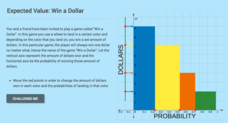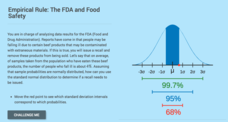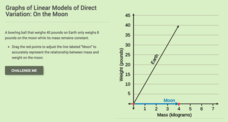CK-12 Foundation
Expected Value: Creating a Discrete Probability Distribution Table
Wanna roll the dice? Determine whether it is a good idea to play a dice game. An interactive presents the rules for a game of dice. Pupils find the probabilities of each event and calculate the expected value of the game. They finish...
CK-12 Foundation
Expected Value: Game of Chance
Determine whether the payoff is worth it. Pupils calculate the expected value of a game with three different payoff levels. Each level has a different probability of winning money. The scholars find the expected payoffs for each level...
CK-12 Foundation
Expected Value: Win a Dollar
Spin a wheel, land on a color ... and win. Learners create a graph to display the probabilities of the amount of money they can win by spinning a colored wheel. The pupils use the dollar amounts and their probabilities to calculate the...
CK-12 Foundation
Expected Value: Playing Darts
The expected payoff is right on target. An interactive resource provides a dart game scenario with amounts of cash prizes and probabilities of winning. Learners calculate the expected value and expected payoff for the game. To finish,...
CK-12 Foundation
Numerical Computations: Counting Out Probability
Keep your heads up while counting. Pupils use an interactive to create a table with the possible outcomes of flipping three coins and then determine the probabilities of getting certain combinations of heads and tails.
CK-12 Foundation
Additive and Multiplicative Rules for Probability: Red Dress? Blue Dress? Both!
The sum of the parts is greater than the whole. An interactive uses a Venn-like model to show the percentage of females from a survey that have a blue dress, a red dress, or both. The pupils determine the numbers in each category...
CK-12 Foundation
Conditional Probability: Colorful Cubes
An interactive provides a model to visually represent the formula for the probability of an outcome. Given 10 numbered color cubes, pupils arrange them on the top and bottom shelf to represent the probability fraction. The learners use...
CK-12 Foundation
Computing Probabilities for the Standard Normal Distribution: The FDA and Food Safety
To recall or not to recall, that is the question. Using provided data, pupils calculate the percent of people that may fall ill on average. The scholars determine the standard deviation based upon the mean and the empirical rule, then...
CK-12 Foundation
Coterminal Angles: Full Circle
Take a terminal side for a spin. Pupils use an interactive to investigate angles of rotation that share the same terminal side. Scholars create coterminal angles and calculate what other angle sizes share the same final position.
CK-12 Foundation
Slope-Intercept Form of Linear Equations: Cable Car Tracks
Get on track to learn about slope-intercept form. Scholars use an interactive to position a line along the tracks of cable car. Applying knowledge of slope and intercepts, they write the slope-intercept form of the equation for the line.
CK-12 Foundation
Intercepts and the Cover-Up Method: The Hidden Zeros
There's no need to cover up this resource — it's good one! Pupils use a slider interactive that covers up parts of the standard form of a linear equation and simultaneously reveals one of the intercepts of the graph. This lets them see...
CK-12 Foundation
Slope-Intercept Form: Mountain Train
Hop aboard to learn about the slope-intercept form. Young mathematicians use an interactive to adjust the path a train takes up a mountain. A set of challenge questions helps them see the connection between key features and the...
CK-12 Foundation
Graphs Using Slope-Intercept Form: Mountain
Climb every mountain, even one you create in an interactive. Individuals solve a problem involving slopes and distances of campsites on a mountain. Answering a set of challenge questions aids in the process.
CK-12 Foundation
Graphs of Linear Model of Direct Variation: On the Moon
You'll be over the moon about this resource. Scholars draw a line representing the weight of an object on the moon based on its mass. Consideration of the constant of proportionality allows them to see relationships between weight of an...
CK-12 Foundation
Intercepts by Substitution: Finding a Linear Product Using a Quadratic
Discover another way to interpret multiplication. Using an interactive, learners slide points (representing the factors of multiplication) along the x-axis of the graph of y = x^2 and observe changes in the line segment connecting the...
CK-12 Foundation
Sets: Bikes or Boards?
Do people ride, slide, or do both? Pupils use an interactive Venn diagram for the numbers of people owning bicycles, owning skateboards, or both. An interactive provides questions for them to answer using the diagram.
CK-12 Foundation
Venn Diagrams: Planets and Dwarf Planets of the Solar System
Yes, Venn diagrams are helpful in science, too. Learners use an interactive to classify celestial bodies as having moons, as dwarf plants, as both, or as neither. They answer a set of challenge questions based on the Venn diagrams they...
CK-12 Foundation
Empirical Probability: Scoring
Learners use an interactive to determine the probability that a soccer player will score a goal. Given data over the course of several days, they determine probabilities for several different situations.
CK-12 Foundation
Theoretical and Experimental Probability: Pizza Night!
Take a bite out of an enticing resource. Scholars use an interactive to study dependent events. They see how the number of favorable outcomes and total number of outcomes changes as individuals "eat" pieces of pizza.
CK-12 Foundation
Definition of Probability: It's in the Bag!
It's not in the bag. An interactive provides the probability of picking a certain color marble from a bag after several marbles have been removed. Young mathematicians learn about dependent events from this resource.
CK-12 Foundation
Measurement of Probability: Basketball Throw
Future mathematicians use an interactive to see how changing the size of a basketball court and the size of a region in the court affects the probability that a ball will randomly fall within the specified region. No calculations are...
CK-12 Foundation
Applications of Probability: What Are the Odds?
Improve your chances of understanding odds. Scholars use an interactive spinner to increase and decrease the number of favorable and unfavorable sections on the spinner. This spinner helps them learn about odds.
CK-12 Foundation
Counting Techniques: Permutations and Combinations
Comparing and contrasting is an important skill, even in mathematics. A drag-and-drop interactive has users classify situations as suitable for permutations or combinations. A set of challenge questions tests whether they know the...
CK-12 Foundation
Operations with Sets: Let's Roll the Dice!
There's no need to roll dice for this probability experiment, the resource includes them already. Scholars use an interactive to see how including more possibilities as favorable outcomes in a dice activity affects the probabilities....

























